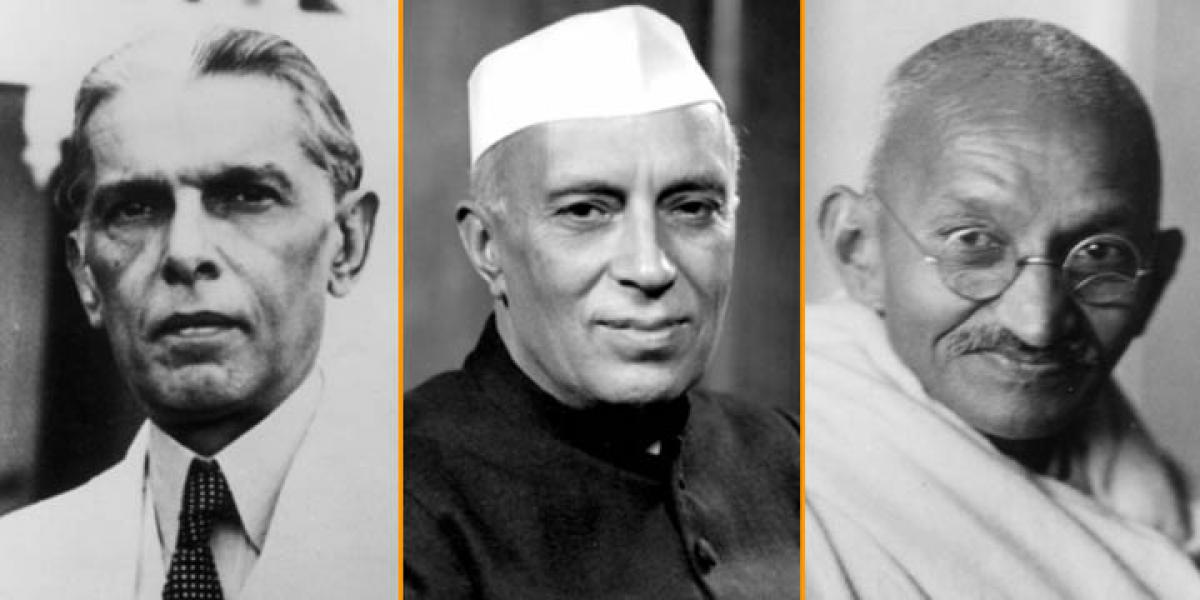Live
- Shahid Kapoor’s ‘Ashwatthama’ kept on hold due to budget constraints
- ‘Drinker Sai’ teaser: Attracts youth
- Netflix Outage in India and US Ahead of Tyson vs Paul Match
- Police Intensify Investigation into Lagacharla Attack on Officers; Eight More Detained
- Google Docs Introduces AI-Powered Clip Art Generator with Gemini
- LIC sets up stall at India Int’l Trade Fair
- Celebrating journalism and its role in society
- Supporting emotional well-being in children
- Govt plans 1 mn sq km oil exploration by 2030
- Empowering the future through quality education
Just In

x
Highlights
I don’t think we hate Gandhi, Nehru. May be some of us blame them for the partition. I don’t want to bring Jinnah and his love to children, but if you analyse the history, it was not Jinnah, but Muhammad Iqbal, who has conceived the idea of Pakistan – a separate nation for Muslims.
Dear Tarek Chacha,
Yesterday, I heard about your comment on “Indians hate Gandhi, Nehru and not Jinnah”.

I don’t think we hate Gandhi, Nehru. May be some of us blame them for the partition. I don’t want to bring Jinnah and his love to children, but if you analyse the history, it was not Jinnah, but Muhammad Iqbal, who has conceived the idea of Pakistan – a separate nation for Muslims.
And we love Iqbal, even today. Even after he conceived the plan and convinced Jinnah to take lead so that partition can be realised. The same Iqbal had penned a parody of his original ‘taran-e-Hind’ as ‘song of Pakistan’.
It is written in the ancient scriptures of India that one’s sins are pardoned by doing one good thing. By penning this song, Iqbal had gained so much punya, his sins for thousands of lives are forgiven. And Jinnah doesn’t matter really; like Nehru he wanted to be the head of new nation, whatever portion that may be)British gave us independence. Iqbal gave us a song that we sing on the eve of independence, forever.
Now, coming to Gandhi, it was before his return Iqbal penned the song and thus you can infer he was amongst the nationalists in India, prior Gandhi. How he got transformed into an Islamist or who brainwashed him were secondary.
For me, what matters is why Gandhi allowed such a situation to prevail in the country for more than two decades after his return and at the helm of the freedom movement; that forced Iqbal to conceive a separate nation.
Iqbal wrote the song in1904 and he first spoke officially regarding Pakistan in 1937. By 1920, Gandhi was firmly in the saddle of the freedom movement.
The brand of democracy Gandhi, Nehru and Patel allowed in the party was a selection based one, rather than an election based one. This was highlighted when Subhas Bose wanted to contest for second term as President and won over the candidate supported by Gandhi, Mahatma resigned saying the party has lost faith in him.
Is this democracy? Is he not bound to respect the judgement of the majority? If all losers leave the party, what would remain of it? In fact, even now, the same congress (which he wanted to dissolve after independence describing it as a propaganda platform created against British that served its purpose) functions with selection based democracy.
In a way, he killed democracy in India nearly two decades before the country became independent.
In 1920s and 1930s, when some leaders of Muslims were slowly drifting away from the nationalist movement (that Congress predominantly was), what he had done to bring all of them under one umbrella. With the kind of following he had (Except Subhas Bose for few years, nobody came near to his popularity, even after his death), he could have prevented the partition.
If Hitler is responsible for the genocide he committed, who would take responsibility for the lives that were lost during partition? I agree, lives of Indians (even Pakistanis, Arabs, Chinese, and Africans) are not as valuable as Europeans and Americans. But, for us, they matter. Gandhi could very well prevent the partition. But, he chose to look the other way. I don’t want to dwell on the reasons.
And, even if some of us blame Gandhi for partition and creating a corruption machine that ruled us for half a century, we regard him as one of the finest men walked on the earth, especially in the last century.
PS: Had the country was not divided, Muslims could be nearly forty percent of the population. Imagine how powerful that community could be, considering the current levels of debates on intolerance in India. A bigger vote bank – more power. It could have been a win-win situation.
Kannan
Kannan([email protected])
More On

Next Story
More Stories
ADVERTISEMENT
© 2024 Hyderabad Media House Limited/The Hans India. All rights reserved. Powered by hocalwire.com







